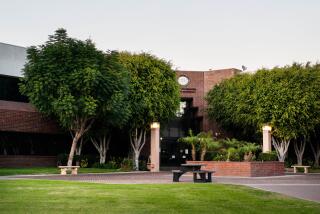Keck Foundation gives $150 million to USC medical school
- Share via
The W. M. Keck Foundation on Monday will announce a gift of $150 million to boost scientific research at USC’s medical school and at two affiliated hospitals, adding to the university’s recent success in attracting supersized donations.
The gift is the single largest in the 57-year history of the Keck Foundation, which has backed many scientific projects, including the famous Keck Observatory and telescopes in Hawaii. For USC, the money marks the third mega-gift since March, for a total of $460 million, as new President C. L. Max Nikias seeks to build the Los Angeles university’s endowment.
The Keck money will be paid out over 20 years with the goal of raising the academic reputation of USC’s medical school now that the university has full authority over USC University Hospital, a 411-bed general care facility, and the 60-bed USC Norris Cancer Hospital, said James Ukropina, a Los Angeles attorney who is a vice president of the Keck Foundation.
In 2009, USC bought the two Eastside hospitals from Tenet Healthcare Corp. for $275 million, ending a long dispute over control and improvements. USC had supplied faculty to the Tenet hospitals and trained students there but had not been able to implement all the programs that professors wanted.
“It’s very difficult to have a leading research university today without a great medical school,” Ukropina said. And strengthening the school and hospitals, he added, “will have immense benefits to the Los Angeles community.”
U.S. News & World Report recently ranked USC 36th in the nation among medical research schools, tied with the Oregon Health & Science University. Harvard was No. 1 and three UC medical schools ranked high: UC San Francisco, No. 5; UCLA, No. 13 and UC San Diego, No. 15.
USC wants to boosts its rankings in that category, as it has done in recent years with the reputation of its undergraduate programs.
The Keck gift is not earmarked to a specific area of medical research, but is being left open for USC to recruit top faculty in fields the school deems most promising, officials said. Those areas include stem cells, cancer, liver disease and preventative healthcare, according to Dr. Edward Crandall, chairman of the school’s Department of Medicine. “We will vigorously target outstanding young and mid-career scientists to come to USC with the help of this money,” he said.
In 1999, the USC medical school received a $110-milllion donation from the Los Angeles-based foundation and was renamed after Keck. With the latest donation, the entire medical center, which is about 7 miles northeast of the main university campus, will bear the Keck name, as will the general hospital; the cancer center will still be named after donor Kenneth Norris Jr.
USC physicians also provide services on a contract basis to Los Angeles County-USC Medical Center, a 600-bed public facility.
The founder of Superior Oil Co., William Myron Keck used his wealth to establish the foundation, which now has assets of more than $1.2 billion. His grandson Robert Day, its current chairman, said in a prepared statement that he expects the research funded by the USC donation will “expand the boundaries of medical knowledge and improve quality of life for vast numbers of people.”
Including the three nine-figure gifts since March and numerous smaller gifts, Nikias said he expects fundraising to total about $1 billion when his first year in office is completed by the end of the summer. In March, USC received its largest donation to date, a $200-million gift to the College of Letters, Arts & Sciences from alumnus David Dornsife, a steel industry businessman, and his wife Dana. In April, engineering school alumnus and oil businessman John Mork and his wife, Julie, gave $110 million for undergraduate financial aid.
The single largest gift to a U.S. college or university was the $600-million pledge to Caltech in 2001 from Intel Corp. co-founder Gordon Moore, his wife, Betty, and their foundation, according to the Chronicle of Higher Education.
Times staff writer Emal Haidary contributed to this report.
More to Read
Sign up for Essential California
The most important California stories and recommendations in your inbox every morning.
You may occasionally receive promotional content from the Los Angeles Times.











